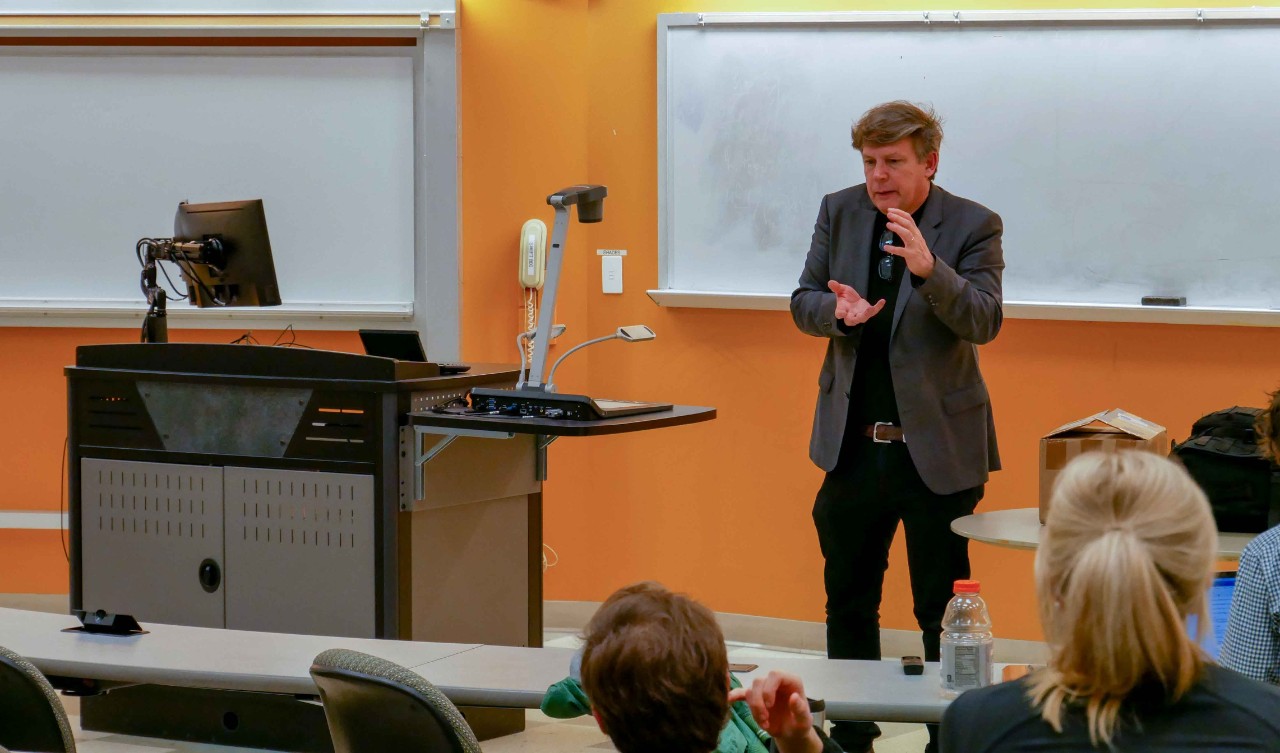
TV show host and entrepreneur gives talk on science communication
Chuck Pell has built his career on making the complicated language of science accessible to the general public.
Pell is host of the 2018 Emmy Award-winning public science TV show Xploration Earth 2050, CSO of the surgical robotics company Physcient, Inc. and founder of five start-up companies.
Pell brought his knowledge of science communication to University of Cincinnati students, faculty and staff during a presentation March 14. His talk was hosted by UC's McMicken College of Arts and Sciences and supported by a Group/Interdisciplinary Award from the Office of the Provost.
The seminar reflected UC’s commitment to academic excellence, a platform of the university’s strategic direction Next Lives Here.
Pell, a self-described “congenital science freak,” said his work in science communication started with physical models.

TV show host and entrepreneur Chuck Pell explains the dynamics of a boomerang to exemplify science communication at work. Pell's talk was hosted by the College of Arts and Sciences and supported by a Group/Interdisciplinary Award from the Office of the Provost. Photo/Corrie Stookey/CEAS Marketing
Physical models surprise us with the insights they give us into a scientific phenomenon, he said. Because they can visually tell a story, models are a staple for both learning about a system and communicating how that system works. Models, however, run counter to what many scientists get bogged down in, and what many non-scientists don’t understand: jargon.
“Jargon allows you to develop precision in language,” said Pell, “but to anyone who is not initiated in that world or realm, jargon sounds like gibberish.”
The goal of a good science communicator, said Pell, is to remove exclusive jargon from science while maintaining science’s factual accuracy.
“You have to abstract what you’re doing and distill it down, without distorting what you’re getting across,” Pell said. “And you have to have a way to say it that’s still cool and interesting without doing [the science] a disservice.”
Jargon allows you to develop precision in language, but to anyone who is not initiated in that world or realm, jargon sounds like gibberish.
Chuck Pell, TV show host and entrepreneur
The process of science communication includes many people, from researchers conducting the work to journalists reporting on their progress to editors deciding how the reports reach the public. Good science communicators recognize these different goals and tailor their communications with these interests in mind, said Pell.
When science communication works, agencies fund research, scientists collaborate across disciplines and society is more prepared to tackle complicated problems.
Pell ended his talk at 5 p.m., the same time Hamilton County issued a tornado warning. As sirens and phones went off, attendees of the talk left the room and went down the stairs. Huddled in a small classroom in the basement, Pell used the reaction to the tornado warning as another example of good science communication.
“When disaster hits, people want science,” he said. “We’re in this room right now because we’ve learned from science how tornadoes work and what they do to buildings.”
In other words, good science communication can even save lives.
Featured image at top: Chuck Pell gives talk on science communcation to UC faculty, staff and students. Photo/Corrie Stookey/CEAS Marketing
Next Lives Here
The University of Cincinnati is classified as a Research 1 institution by the Carnegie Commission and is ranked in the National Science Foundation's Top-35 public research universities. UC's graduate students and faculty investigate problems and innovate solutions with real-world impact. Next Lives Here.
Related Stories
New Dungeons & Dragons ethics seminar takes flight
July 7, 2025
On a blisteringly hot summer day, laughter echoed through the cool, damp basement of the Avondale branch of the Cincinnati Public Library. Young teenagers huddled around a table littered with pencils and paper, rolling dice and bonding over a game of Dungeons & Dragons. University of Cincinnati undergraduate student Charitha Anamala sat behind a trifold card with a blazing red dragon on it, serving as the group’s Dungeon Master (DM) or campaign organizer. Within the fantasy setting she described, it was hard to tell the adventure was a lesson in ethics.
UC language studies program adopts new technologies
July 7, 2025
Cultural immersion is a tried-and-true method for teaching languages. U.S. students travel abroad—to Europe, Latin America, Asia and beyond to take a deep dive into the customs, mores, daily life and conversational language that can be challenging to master from home. For those students who can't take advantage of the study-abroad experience, there's another option to gain the same learnings. At UC, the Curricular Enhancement, Development, Access and Research Language Resource Center (CEDAR) has developed a curriculum that features virtual reality (VR) technology to give students a similar opportunity right in the classroom.
Distinguished UC professor receives career achievement...
July 3, 2025
The College of Arts and Sciences Research Professor Gail Fairhurst was awarded an International Communications Association (ICA) Career Achievement Award. The Steve Chaffee Career Achievement Award goes to theoretical development or research related to communication studies. The ICA created the award in 2000 for its namesake, Steven H. Chaffee, who was a trailblazing scholar in journalism and communications academia.
